Corporate


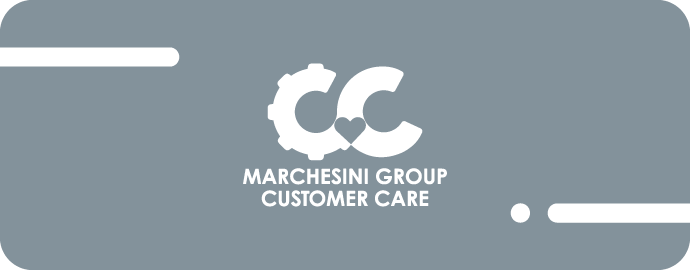

Marchesini Group is committed to looking after its people, facilitating their personal and professional development, creating initiatives to grow skills, know-how and competences. All individuals must be guaranteed equal opportunities in terms of training and career advancement, in line with criteria of merit and the results achieved.
We believe in the force of collaboration between people; that is why we promote effective collaboration based on shared values, objectives and methods and supported by passion for the job. Relations between people must be characterised by constant and reciprocal exchanges of ideas in relation to work duties and behaviours, with the aim of consolidating a culture of feedback.
Appraisal of the performance of each individual must consider not only the milestones reached but also how results are achieved, rewarding integrity, honesty, passion, dynamism, enthusiasm and innovative thinking.
At 31/12/2020 Marchesini Group had a workforce of 2,045 (+ 9.7% compared to 2019), human capital represented by STEM
profile workers in the measure of 80%.
The workforce reflects a level of generational diversity that facilitates the exchange of experience and skill sets, with:
• 90% employed in factories in Italy;
• 65% between 19 and 45 years of age;
• women totalling 17%, + 0.5% versus 2019, in line with average rates in the sector;
• 99% of staff are on open-ended contracts;
• 64%49 with a high school diploma;
• 22%49 university graduates.
The employment contract applied is the National collective agreement of 5 February 2021 for workers in the mechanical engineering and plant installation industry.
The skills and know-how of Marchesini people are a legacy to be grown, promoted, and passed down to the new generations. That's why the company promotes new modes of exchange and cross-contamination inside the Group and towards the exterior, to forge ties between institutions, universities, business schools, state schools and the job market, attracting talent and supporting orientation of young people towards STEM disciplines.
Promoting STEM activities is a key investment for Marchesini Group in relation to the goal of meeting the growing demand for skills and qualified personnel for the business sector, while creating positive fall-out for all high technological intensity sectors.
The attention devoted to people is also expressed by means of employee welfare support projects and social
and cultural initiatives which strengthen the Marchesini Group's presence and dialogue in the local area and
consolidate its industrial vocation and historic legacy.
From 2015 onwards, figure also includes foreign company employees
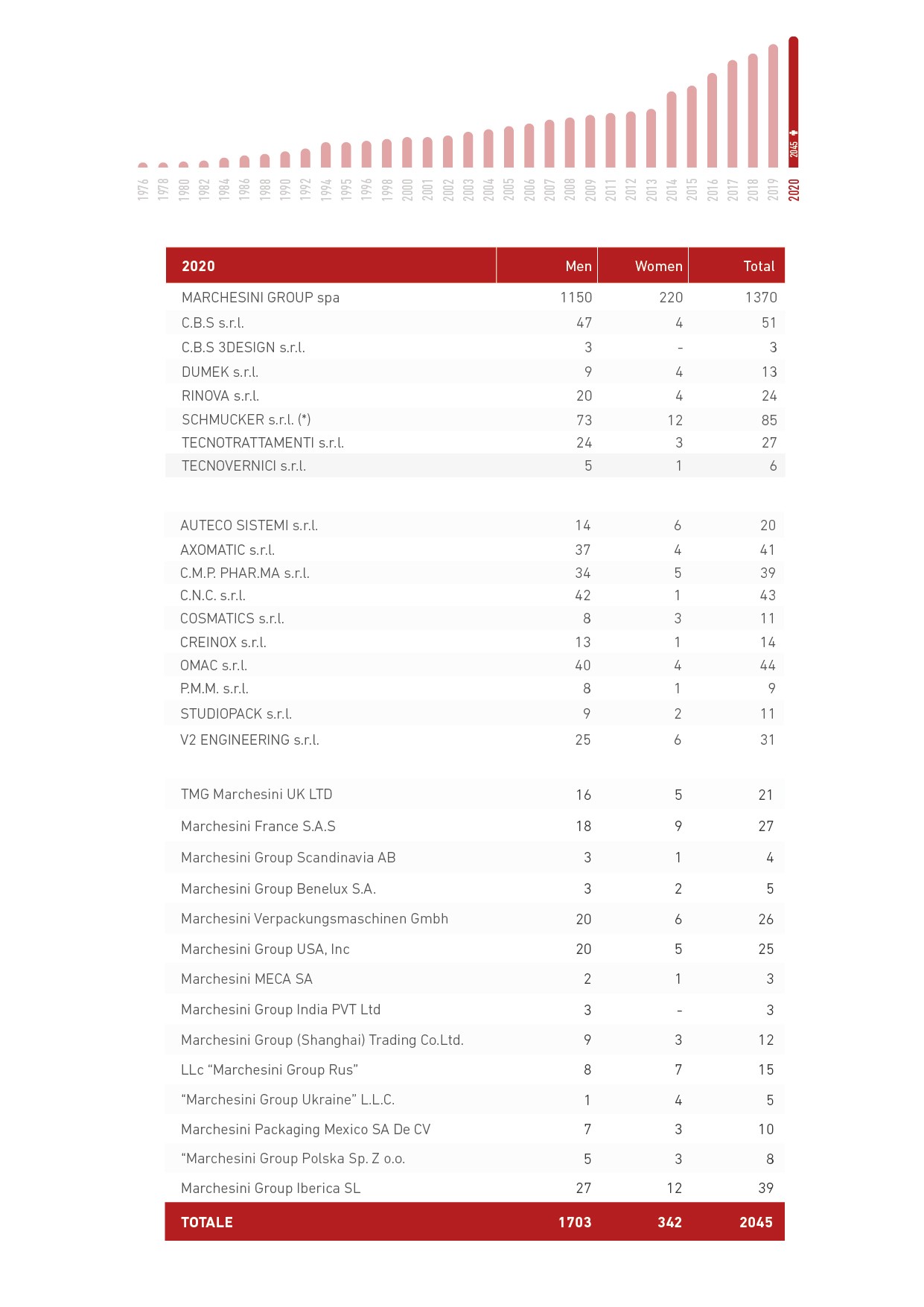
The Group's personnel are encouraged to grow professionally, assisted by resource management processes, incentives, and motivation building.
This is the background to the continuing initiatives in the areas of:
All too often, we are unable to find the professional skill sets we need. Young people are reluctant to choose technical education programmes, and we need specialised technicians and engineers with a good knowledge of English. This topic has been addressed repeatedly, and the company has carried out several targeted initiatives on its own account over the years. We are seeking school-leavers from technical colleges and graduates with degrees in mechanical engineering, electronics and automation.
As in the specialised mechanical engineering sector, finding suitable human resources for integration in an organisation like Marchesini Group remains a critical aspect from the strategic perspective. This situation is hard to resolve in Italy because it is mainly due to the business-education gap and the idiosyncrasies of the Italian education and training system.
Marchesini Group has therefore defined its talent acquisition strategy with the aim of moving beyond the concept of mere recruiting, which compares to talent acquisition as do tactics (short-term actions) to strategy (long perspective planning). Recruiting is a talent acquisition subset and it includes sourcing, curricula screening, interviews, assessments, selection and hiring and, in companies like those of Marchesini Group, also initial onboarding activities. Talent acquisition cannot occur without the recruiting stage, but recruiting can be carried out without a defined talent acquisition strategy.
Talent acquisition implies a more efficient candidate-centred process that is easier to manage in relative terms (once the process has been set up and launched). The process is cyclic rather than linear: instead of being simply aimed at filling a temporary need for staff, it looks ahead and seeks to lay the foundations to ensure that similar positions can always be filled in the future, and Marchesini Group intends to improve it constantly in order to strengthen all areas of the company, relying on the skills of the more experienced men and women in the team, combined with the enthusiasm of people at the beginning of their career.
The key strategies implemented by the Group to attract and select talent include many activities carried out in liaison with Italian Universities. Marchesini Group has traditionally cultivated solid relations with the local technical institutes in its operating areas, in order to select the best candidates, keen to embark on a professional career starting from the school-leaving stage. In this context, specific recruiting activities are carried out with the aim of meeting young people about to sit their diploma examinations and invite them to attend a recruitment open day at the company, tailored to reflect the types of professional profiles being sought.
In 2020, Marchesini Group took part in 9 Career Day events organised at the most important universities in Italy. These initiatives are promoted by the institutions to facilitate direct and “informed contact” with key players in the manufacturing and business world. Thanks to this activity the recruitment department was able to vet the curricula of some 733 candidates. Of these, 113 were deemed to be suitable for further investigation and 13 candidates (7.7% of suitable applicants) were hired.
Training in Marchesini Group is construed as an opportunity for development of new actions to provide the company with the possibility of innovating and reinventing itself continuously.
In 2020 Marchesini Group launched the “Talent Garage” project, effectively inaugurating its new Academy. The initiative – the most significant Group investment aimed at research and training of youth talent in the Bologna area and nationwide – has already produced a series of structures, initiatives and agreements with schools and universities aimed at creating ad hoc
training pathways for existing and future personnel. A new structure therefore, designed from the ground up as a talent lab. A place where skills are absorbed by working alongside the most highly skilled staff in the organisation. A continuous training workshop, intended not just for talented young people but rather for the entire company population, forming part of an exceptional project of discovery and personal qualification.
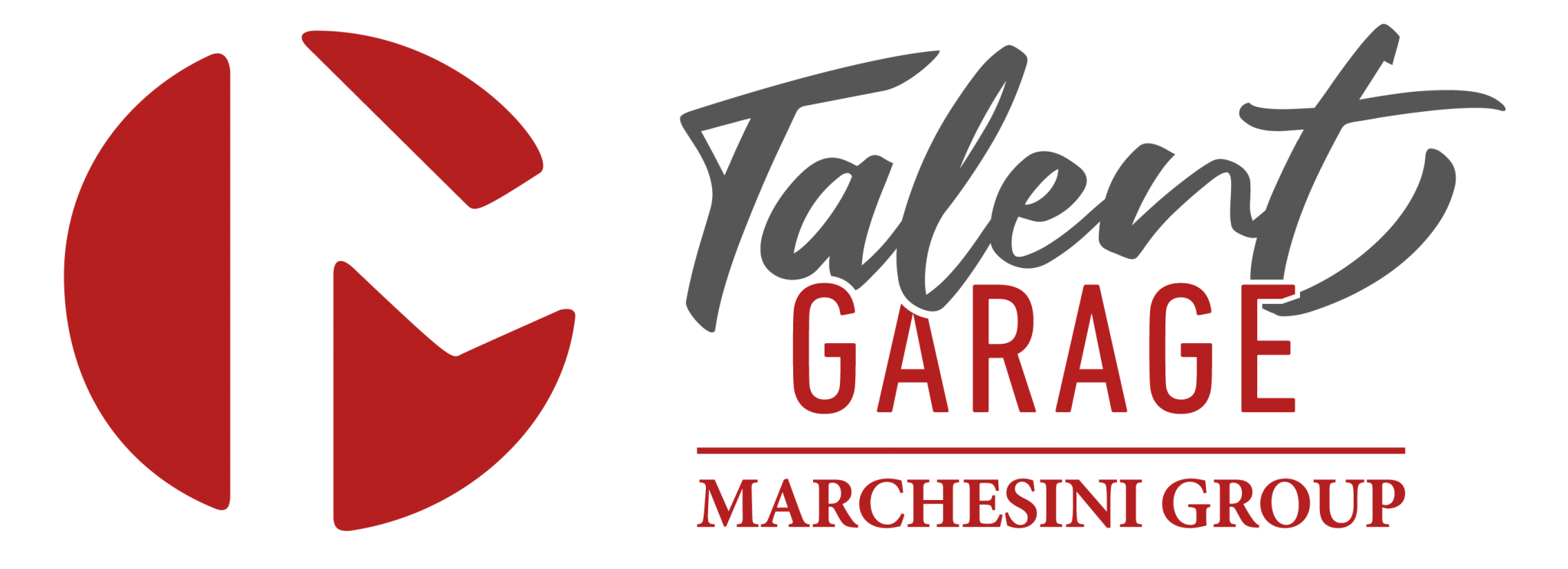
The Talent Garage project is supported by a series of related initiatives, especially “unfuturoalmassimo”, the annual scholarship programme named after the company's founder, Massimo Marchesini.
A grant of between €400 and €4,000 each for the Group's personnel and their children who
• are enrolled in or have gained a diploma with merit from secondary schools with STEM curricula;
• are enrolled in or have graduated from STEM degree courses;
• have secured an academic Master in STEM disciplines.
starting from the 2019/2020 academic year.
Following a selection procedure, 22 scholarships were assigned in 2020 for an overall amount of €31,350, of which:
• 13 scholarships awarded to students or school leavers of STEM specialised secondary schools for the total amount of €7,150;
• 9 scholarships awarded to undergraduates or graduates of STEM degree courses for the total amount of €24,200.
Appraisal of the performance of each individual must take into account not only the milestones that have been reached but also how the results were achieved, rewarding integrity, honesty, passion, dynamism, enthusiasm and innovative thinking.
This assumption lies at the basis of the Group's process of assessment of individual performance and professional growth, which is construed as the completion of the training process in the Marchesini people development strategy.
The basic principles of the assessment process adopted by the Group recognise as key factors the definition of the objectives and expectations of each individual in relation to the corporate vision, sharing of the same, assessment of the results achieved and preparation of a development plan.
In a context wherein the size of the Group is increasing constantly, it is essential to be able to manage HR processes organically, using functional tools that integrate and standardise the Human Resources management and development processes on Group level, including the administration of data concerning personnel, and the selection, training and assessment processes also of companies whose human resources are not managed directly. All is nonetheless underpinned by an awareness that the people involved in the organisation are not reactive merely in relation to economic considerations, but also in relation to complex conditions of the social (needs and expectations) and work (remuneration) experience, and also the job conditions in terms of independence, responsibility, prospects for promotion, etc..
For more than six years, i.e. from the time of implementation of the l’MPORTANT project, the crucial element in the Group’s human resources performance review process is motivation, i.e. the energy that feeds the dynamic of individual behaviours and actions, directs them and orients them towards the achievement of general and specific goals.
The model adopted for operation of this corporate process is not simply a “tool” used to align managerial resources in relation to the Company’s objectives, rather a process that must allow human resources to be managed and developed with the goal of:
• integrating human capital in the organisational system and bringing it into line with the
company’s objectives and factors of success;
• improving vertical communication (supervisor - collaborator, collaborator - supervisor);
• highlighting organisational development needs (change of roles, career plans, personal
goals, shadowing, classroom training, etc.);
• rewarding the best personnel (in accordance with the company’s remuneration policies).
Corporate welfare is a set of benefits and services designed to exceed the equivalent purely monetary component in salaries in order to support the employee's income and improve his/her private and professional life.
Marchesini Group has been pursuing measures in this area for some time, launching initiatives in recent years such as the company catering service, support for nursery school fees for workers not resident in the local municipal area, the “Ci pensa la mensa” initiative (takeaway meals booked at the canteen at super low prices and collected at the end of a work shift) and programmes for the prevention of certain types of cancer, pursued in liaison with the non-profit Fondazione ANT.
Also in 2020, despite the anticovid restrictions, all Marchesini Group S.p.A. employees were able to make use of the majority of the benefits provided in prior years, including:
From the corporate welfare standpoint, the exceptional year of Covid-19 can be summarised in several precise moments of its growth path:
These are decisive aspects that highlight the way in which corporate welfare can play a significant role, also in the complex challenges facing companies and workers in the Covid-19 era.
The Group has maintained its voluntary corporate welfare programme launched in 2016 via a multiservice platform that was completely revised in 2020, resulting in improved usability.

The expression “local area” does not refer to the geographical space or pedological aspects of the terrain, but rather to a living and highly complex entity, the result of synergic co-evolutionary processes between human settlement (organised along cultural lines) and environment (organised along geological and biological lines) ... Each area is thus a location that incorporates the concepts of time and prolonged duration and possesses an identity, a soul, and a creative force.
It is in these terms that Marchesini Group understands the area in which it conducts its operations, and it is this awareness that determines the specific relationship between company and local development long before this concept started to attract the attention that it currently garners in the economic debate. From a passive and indiscriminate entity, the local area has become an actor of development and a new company stakeholder. In this context, as a result of its interpretation of corporate social responsibility, the company has never seen itself as a sealed system with respect to the expectations, interests and needs of the local area but rather as an attentive listener to the real needs of the environment and communities that surround it and as a driver of development.
HOME EDUCATORS
When living through an emergency such as the one caused by the Covid-19
pandemic, the first action that can be taken by those wishing to offer
assistance is to place their own resources or abilities at the disposal of others:
From the start of the Coronavirus emergency Marchesini Group listened carefully to all the requests for help received, especially those arriving from our staff, in line with the values expressed and shared in our Code of Ethics and in our Sustainability Report.
Faced with the worsening of the health situation due to the pandemic and the consequent lockdown extended to the entire country on 9 March 2020, while on the one hand, in consideration of its core business Marchesini Group was among the sectors that was allowed to remain in operation, on the other hand a large number of the families of its personnel were faced with objective difficulties created by the closure of all schools in Italy, of all levels and types, including public and private institutions. This situation, in the case of underage children, especially when other family members (often grandparents) were unavailable, made it necessary for one parent to take time off work to look after the children, also in consideration of the fact that the schools had progressively adopted distance learning methods (online) and pupils had to be supported and monitored during their lessons, in their homework, and in their periodic assessments. The Company immediately realised it was required to manage a major problem: out of the 249
thousand women who lost their jobs in 2020, some 96 thousand were mothers with underage children. Of this latter number, 4 out of 5 have children under the age of five: these are the mothers who, due to the need to look after younger children, were obliged to give up their jobs or were dismissed by their employers.
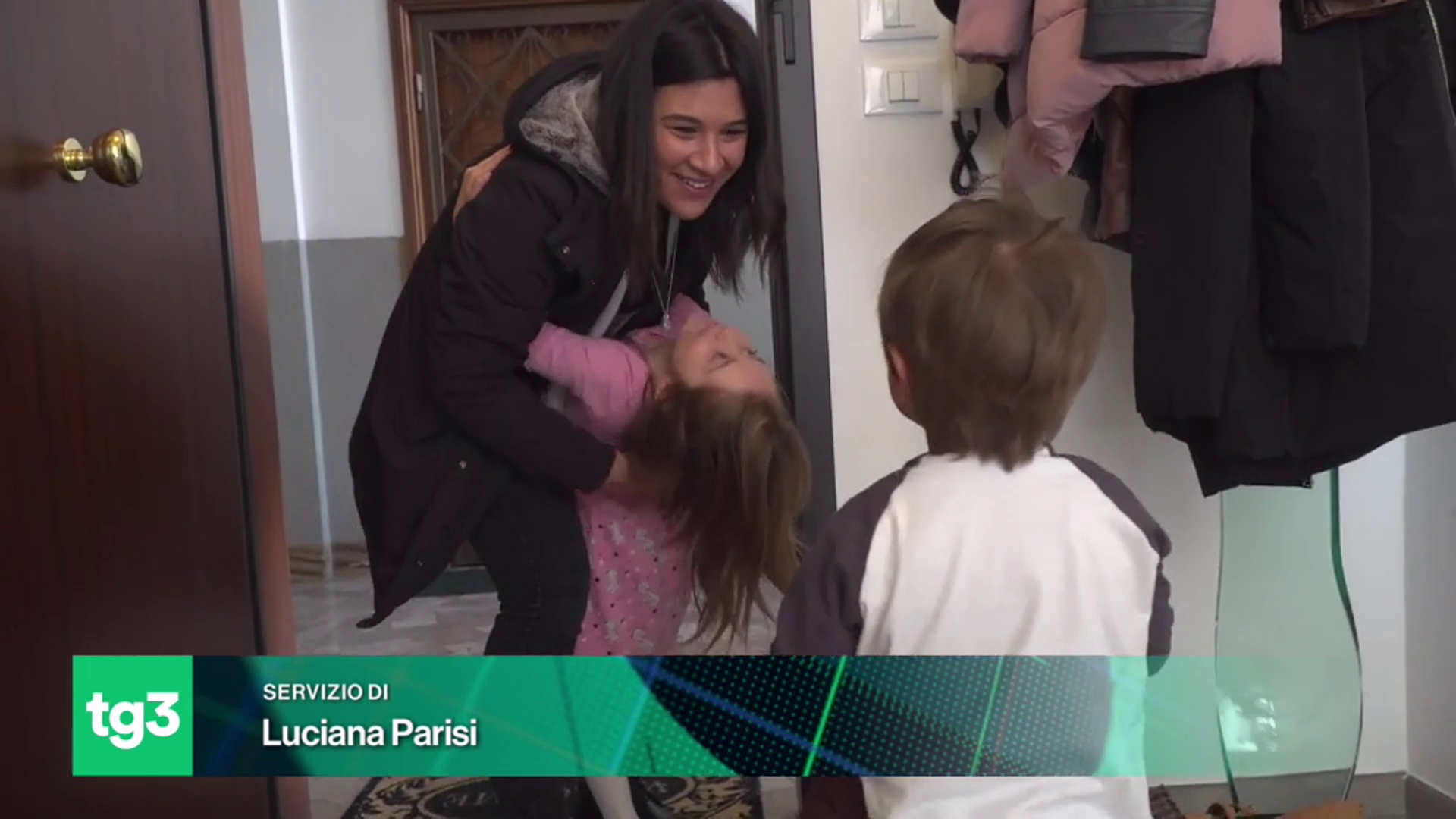
In the Bologna area in particular, site of the Group's headquarters, the Company maintains close relations with the main technical colleges and high schools for the sciences, with Alma Mater Studiorum – University of Bologna, the University of Modena and Reggio Emilia and the University of Ferrara.
In the Bologna area in particular, site of the Group's headquarters, the Company maintains close relations with the main technical colleges and high schools for the sciences, with Alma Mater Studiorum – University of Bologna, the University of Modena and Reggio Emilia and the University of Ferrara.
Moreover, in Bologna, the company has long nurtured a relationship with the B.V. di San Luca Salesian Institute and with the Aldini Valeriani Sirani senior high school, involving the transmission of specialised technical competences by sending some of its top personnel for teaching sessions and supplying unused mechanical components for experiments directly on
the part.
Another initiative in which the company is participating actively is Fondazione Istituto Tecnico Superiore Meccanica, Meccatronica or, for brevity, the ITS Maker foundation of Bologna and Siena. The ITS MAKER Foundation operates in the area of tertiary instruction, in compliance with the programming of the offering of the regional network of Polytechnics, assuring training at the
post-secondary level of technicians with higher skill levels than national averages, able to meet demand from the mechanical engineering, mechatronics, automotive and packaging sectors. The Foundation also supports integration of training chains (education and professional technical training) and the economic and manufacturing chain with special reference to professional
technical hubs and measures for innovation and technological transfer to small and medium size companies. It works to elevate the technical, technological and scientific culture with the aim of building, qualifying and upgrading technical-professional competences, promoting the orientation of young people and their families towards careers in the technical field.
Another initiative of major social relevance, both due to its value and to its results, is the “Fare Impresa” project in Dozza S.r.l., in which Marchesini Group holds a 30% stake. The idea of building an enterprise in the Dozza prison in Bologna in order to assist the rehabilitation in civil society of individuals in objective conditions of disadvantage, applying the principles of “solidarity sourcing”, took its first tentative steps in 2008. Today, a little more than ten years down the line, the FID project is a unique experiment in Italy, born out of a profitable relationship between professional training, business enterprises and the institutional sphere. The formula
consists in creating a fully-formed social enterprise in Bologna prison – following a technical training programme provided by the Aldini Valeriani Foundation – in the context of the production of Marchesini Group, G.D. and IMA with the aim of training resources who can then enter the job market, providing inmates with stable and enduring employment opportunities that can be
put to good advantage once they have finished serving their sentence. FID operates like any other small company, with terms of employment in line with the national bargaining contract agreed between the unions in the sector and with the benefit of having a relatively protected market because it is effectively composed of the self-same organisers of the operation.
The training process makes use of a well-attended group of tutors, people who have worked in the company for a lifetime and have then preferred to remain at “the works” once they reach retirement age, choosing to devote their experience to the upcoming generations and thus becoming “teachers”. The technical contents communicated are aimed at acquiring the knowhow
and professional skills necessary for mounting and assembly of mechanical parts and construction of simple components. Contents also include the topic of health and safety in the workplace. The real innovation of FID lies in the formula used, which requires an investment in the human capital concerned, deemed to be capable of revolutionising past questionable rehabilitation experience in a prison environment while continuing to pursue the company’s core business, but with an added ethical value. A best practice that extends far beyond a question of philanthropy. The “founding partners” chose to interpret their role through this initiative,
placing the project’s extraordinary social values and a strong sense of responsibility towards the community in which they operate ahead of the notoriety of the brands represented by each, in the hope that many more companies will join in the future to swell the ranks of FID supporters.
In 2020 Marchesini Group S.p.A. received an award from the UN agency for refugees, UNHCR, with the logo Welcome – Working for Refugee Integration, for having facilitated the employment of two refugees and for having supported their process of integration in Italy. In this manner, UNHCR chose to certify the contribution of companies towards a more inclusive society in relation to people forced to flee their homes due to conditions of war, violence and persecution.
Because the concept of Made in Italy does not only refer to exceptionally high-quality products, but also the social values of hospitality, diversity, and Italian entrepreneurship, that are capable of inspiring the world, not merely in commercial terms but also on the human level.
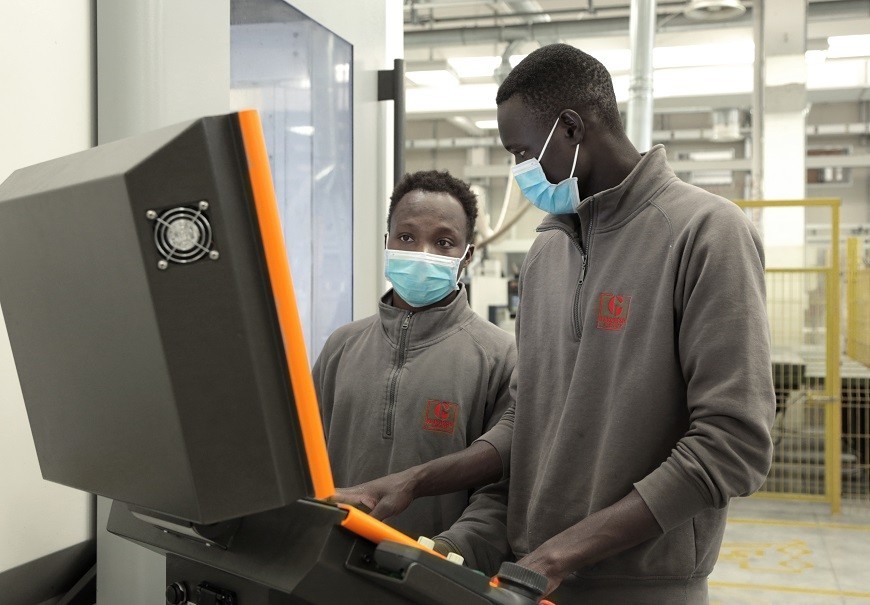
Marchesini Group respects and adopts the requirements to work in safety defined by the specific regulations in force in Italy and in the countries in which the Company operates.
Active prevention of the risk of injury and protection of health are stated aims of Marchesini Group's safety policy, which calls for the adoption of management systems in compliance with standards and activities of awareness raising and ongoing training for employees, including employees seconded to other countries, contractors and service suppliers operating on the Group's sites.
The attention paid to people is also expressed in the search for solutions to improve the well-being of employees and to promote their work-life balance. Health and safety of personnel are essential conditions calling for special attention, through the adoption of
preventive measures, technological development, training, and continuous monitoring. All business activities are conducted in line with statutory legislation concerning occupational health and safety in accordance with the precepts of the Code of Ethics and the Safety Policy. In addition, the Group guarantees the highest possible safety standards for operators by means of organisational and management measures, and also through technical solutions, constant alignment with the latest technologies, and the creation of training courses. With reference to the Group’s Italian companies, the safety management system requires the presence of all the necessary functions, in line with the relevant legislation. In this context, Health and safety executives (HSE) and Health and safety officers (HSO) have been appointed for each of the production units, inside or outside the company, in compliance with the applicable legal parameters.
To guarantee adequate representation of workers within the Safety management system, employees are required to elect Health and safety representatives (HSR), responsible for representing staff during trade union meetings to discuss the topics in question and any actions to be taken.
14 injuries were logged in 2020, up by 40% compared to 2019. No fatal accidents occurred. The increase in the severity coefficient is due to the occurrence of two injuries of greater seriousness than usual, one of which occurring during travel and one at the company’s premises. In compliance with the relevant statutory legislation, education and training programmes have been
developed in the areas of occupational safety, first aid, fire-protection regulations, the consequences of alcohol and narcotics, specific risks associated with various job descriptions, and environmental aspects, even if not mandatory according to local legislation. In terms of each operating unit, the Group provides its employees with training courses concerning the environment and safety, calibrated to match the duties of individual workers. The courses may concern correct management of mechanical or electrical risks or risks originating from handling chemicals, or instructions to follow in order to minimise environmental impact (e.g. for waste handling activities).
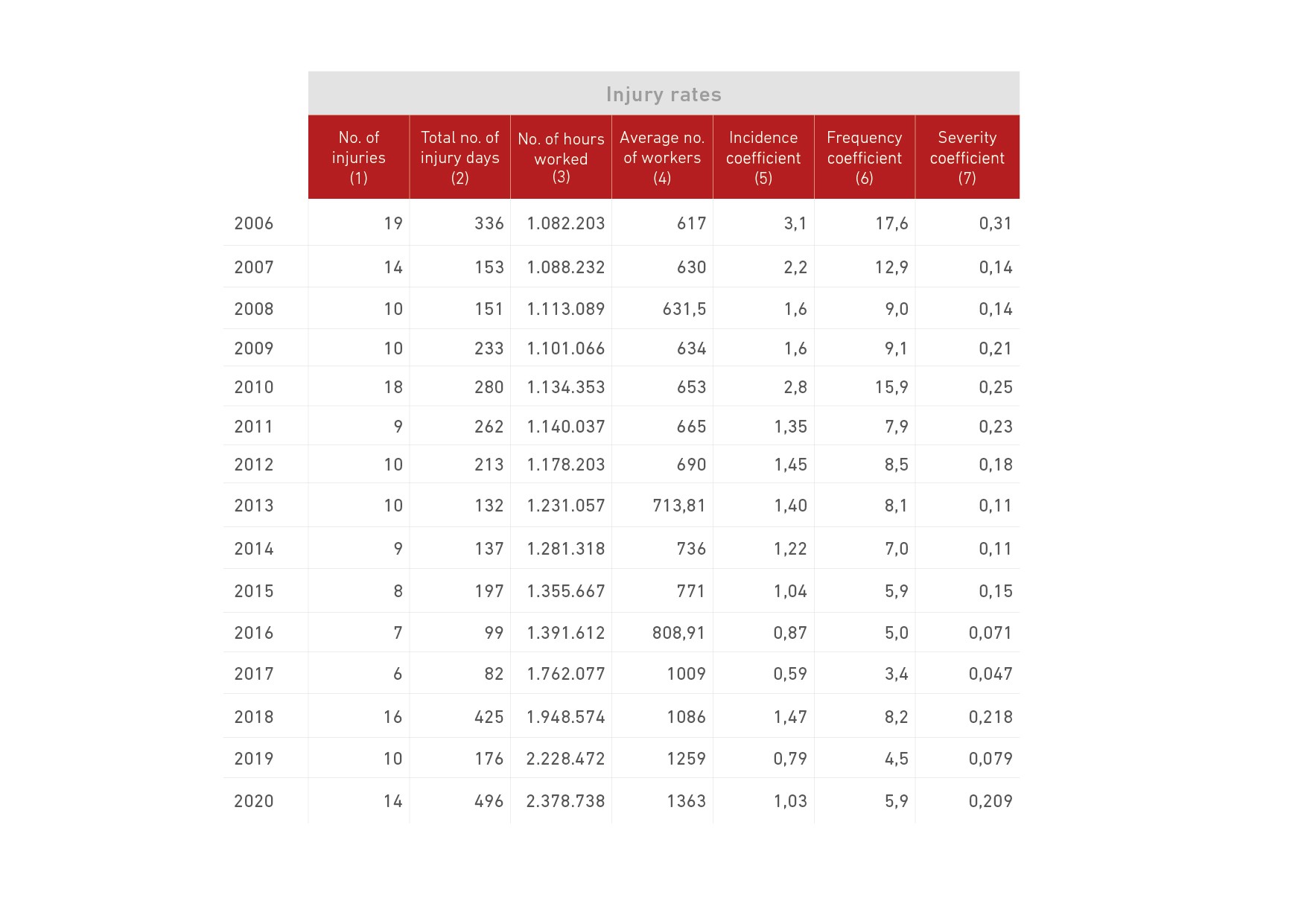
The health emergency affecting the entire world, which is effectively still ongoing, constitutes a major challenge and has forced us to take action to make an abrupt change in working practices and routine activities.
Our company organisation has been revolutionised to deliver all the necessary actions to protect the health of the employees, customers and suppliers who typically orbit around Marchesini Group on a daily basis. This programmatic action has proceeded in parallel all over the world, thanks to our dense network of branches, with the maximum possible operational continuity in production, Customer Service, installation, technical assistance, maintenance, and spare parts.
Our QHSE team has worked tirelessly, relying on the contribution of the entire MG community, to implement all the anti-Covid-19 procedures required by current regulations to protect the health of all. Marchesini Group invested more than €800,000 in the anti-covid operation, which consisted of the activities described below
1. Information At The Basis Of Everything
2. Entry Into The Company Occurs In Conditions Of Complete Safety For Employees ...
3. ... And For Customers, Suppliers, And External Personnel
4. Hand Hygiene In All Company Areas
5. Constant Cleaning And Disinfection Of The Premises
6. At Work With All The Necessary Ppe
7. Aware Use Of Communal Spaces
8. Limited International Travel
9. Know What To Do In Case Of Need
10. Company Organisation